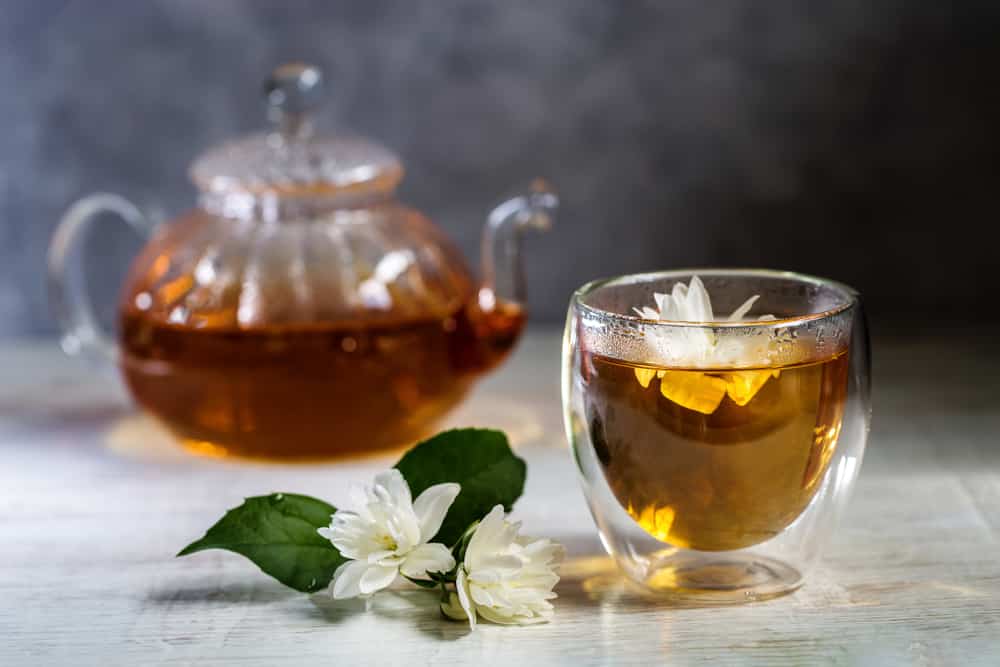One of the best ways to live a healthy lifestyle is by eating right. Health experts suggest consuming a variety of healthy foods to live an even healthier lifestyle. In addition, this can also lead you to reap numerous health benefits.
One of the beverages that never lacks in the list of such healthy foods is ginger cinnamon tea. It is one of the most beneficial types of tea, as research associates its ingredients with numerous health benefits. In addition, it is also very easy to prepare since it is made with common spices in your spice rack.
In this article, we will dig deep to discover more about the benefits of this unique and flavorful tea, and also discuss possible side effects. Let’s go!
What Is Ginger Cinnamon Tea?
As the name suggests, this refers to a brew prepared from two (2) primary ingredients: ginger and cinnamon. Ginger is one of the most commonly used herbs in preparing traditional medicines, food, and tea in Chinese and other Asian culinary cultures (11).
Cinnamon is a flavorful bark that is mainly used as spices and as a pharmacological agent, thanks to its possible medicinal benefits (19). Over time, culinary experts have discovered the magic that comes from blending these two.
One of the drinks that the combination of these two (2) spices is used for is ginger and cinnamon tea. This tea has become one of the go-to drinks for flavor, enjoyment, and, most importantly, health benefits.
Intense sweat sessions, working weight loss tips, lip-smacking recipes come in one package with the BetterMe app. And all of it is at your fingertips, start transforming your life now!
Ginger Cinnamon Tea Health Benefits
If you have made this tea before, you might be familiar with the pleasing aroma that comes with it. The tea has numerous possible health benefits to offer as well, thanks to its combination of two (2) of the most healthful ingredients in culinary history.
Some of its potential health benefits are the following:
Reduced Risk Of Diseases
Both ginger and cinnamon have properties that may contribute to a lower risk of chronic disease. WebMD states that ginger has antioxidants and anti-inflammatory properties that might help reduce the risk of diseases like cardiovascular disease (20).
Cinnamon also has anti-inflammatory, antioxidant, antidiabetic, and antimicrobial properties (9). These properties may help reduce the risk of diseases like cancer, type 2 diabetes, cardiovascular diseases, and other conditions (13).
Reduced Blood Sugar Levels
Several studies on animals and humans suggest that consuming cinnamon can help reduce blood sugar levels (21) (22).
Lower blood sugar can help reduce the risk of health conditions, such as heart-related conditions and type 2 diabetes (8).
However, WebMD reveals that scientists still lack a clear picture of how cinnamon reduces blood sugar levels (13). As a result, it is hard to state the exact dosage and timeline to consume this tea for this benefit.
Reduced Inflammation
Both cinnamon and ginger have anti-inflammatory properties (2) (7). It makes ginger cinnamon tea a top inflammation-fighter drink.
Reducing inflammation may be vital because chronic inflammation is associated with several chronic diseases, such as cancer, diabetes, heart disease, and rheumatoid arthritis (3).
Inflammatory conditions like rheumatoid arthritis worsen with age, so consuming this tea could be considered a natural remedy for older adults (13). Even so, they should consult their healthcare provider before adding this beverage to their diet plan.
Packed With Antioxidants
Ginger and cinnamon tea is also packed with antioxidants, which are highly beneficial in our bodies. Most importantly, antioxidants protect our cells against damage from free radicals that cause oxidative stress (14).
Oxidative stress has been associated with immune deficiency, heart disease, stroke, arthritis, respiratory diseases, Parkinson’s diseases, emphysema, and other ischemic and inflammatory diseases (18).
Antioxidants in the body also help decompose peroxide, inhibit enzymes, act as a hydrogen and electron donor, synergist, and metal chelating agent (17).
Read more: 8 Weight-Loss Tea Options With Science to Support the Pound-Slashing Claims
Weight Loss
Drinking ginger cinnamon tea might also be helpful when trying to lose weight as part of a healthy, balanced, reduced calorie diet. Although cinnamon is sweet-tasting, it has very few calories and is sugar-free (20). It can provide a pleasing sweet flavor without the calories of sugar, helping you to keep on track with your calorie deficit.
Research also suggests that cinnamon may stimulate the fat-burning process by enhancing thermogenesis in fat cells (5). Ginger may also have a role in weight loss (23).
In a study conducted to determine the effectiveness of ginger on weight loss, researchers discovered that ginger consumption was associated with reduced body weight and other measures (23).
Additionally, it is also believed to promote weight loss because of its zingerone and shogaols compounds.
According to Medical News Today, these two (2) compounds may affect the fat-burning and storage processes in ways that may help with weight loss (15).
Now, before you go and start drinking tons of cinnamon and ginger tea for weight loss, you need to consult with your doctor. That will help you determine how best to incorporate it into your diet plan without causing adverse effects.
Ginger Cinnamon Tea Side Effects
Drinking this tea has several potential side effects, which is why you are advised to consume it in moderation. Adverse side effects seem to be rare with doses of ginger between 500 and 1000 mg per day (15).
The most common side effect is gastrointestinal discomfort. According to Medical News Today, pregnant women should not exceed 1 g of ginger daily, whereas the general public should not exceed 4 g (15).
The tea may also cause side effects when it interacts with several medications, for example, medications that thin the blood like warfarin (15).
Such drugs may interact with ginger resulting in adverse effects like bleeding and bruising, which is why you must speak with a doctor before taking this tea if you are on any medications.
Is It Safe to Mix Cinnamon and Ginger?
Mixing cinnamon and ginger is safe; both spices have a long history of use in traditional medicine and cooking. They are commonly found together in many recipes, such as teas, curries, and baked goods. These two spices not only add flavor to dishes but may also offer numerous health benefits.
The exception to this rule is when someone has a specific allergy or sensitivity to either cinnamon or ginger. In these cases, it’s best to avoid consuming both spices together.
Signs that you may be allergic or sensitive to cinnamon include skin rashes, itching, and swelling. For ginger, symptoms may include nausea, bloating, or an upset stomach.
Whether you’re looking to simply pep up your fitness routine, jazz up your diet with mouth-watering low-calorie recipes or want to get your act together and significantly drop that number on your scale – BetterMe app has got you covered! Improve your body and revamp your life with us!
Can I Drink Ginger Cinnamon Tea Every Day?
You can drink ginger cinnamon tea every day as part of a healthy diet. Ginger and cinnamon both have anti-inflammatory and antioxidant properties, among other potential benefits (4) (12).
However, like most things, moderation is key. Consuming excessive amounts of either ginger or cinnamon can lead to potential side effects.
For example, consuming large quantities of cinnamon may cause liver damage (1) while drinking too much ginger tea may cause heartburn or an upset stomach (10).
How to Make Ginger Cinnamon Tea
Making ginger cinnamon tea is a simple and delicious way to reap the benefits of both spices. Here’s how you can make it at home (16):
- Gather your ingredients: You will need fresh ginger root, ground cinnamon, water, and honey (optional).
- Peel and chop the ginger root into small pieces.
- Boil 2-3 cups of water in a pot.
- Add the chopped ginger and 1-2 teaspoons of ground cinnamon to the boiling water.
- Let the mixture simmer for about 10 minutes, stirring occasionally.
- Strain the tea into a cup and add honey to taste if desired.
- Enjoy your homemade ginger cinnamon tea!
Other Ways to Incorporate Ginger and Cinnamon into Your Diet
Aside from drinking ginger cinnamon tea, there are many other ways to incorporate these spices into your diet. Some ideas include:
- Adding them to baked goods such as cookies, cakes, or muffins.
- Sprinkling cinnamon on top of oatmeal or yogurt for a flavorful and healthy breakfast.
- Using ginger and cinnamon in marinades or sauces for meat or vegetables.
- Brewing a ginger cinnamon latte by adding the spices to your coffee or espresso.
- Creating a spiced rice dish with ginger, cinnamon, and other seasonings like turmeric and cumin.
Read more: Steamed dumplings: One Recipe That’ll Change Your Snack Game
FAQs
Can Cinnamon and Ginger Reduce Belly Fat?
No; cinnamon and ginger isn’t a magic solution for losing belly fat. While both spices may offer some potential benefits for digestion and metabolism, they cannot specifically target or reduce belly fat on their own.
Losing belly fat is only possible through a combination of proper nutrition, exercise, and overall healthy lifestyle habits (24). Creating a calorie deficit using these principles is the key to losing fat in all areas of the body, including the belly (6).
Drinking unsweetened cinnamon ginger tea in place of sugary beverages may help with weight loss efforts. The tea is certainly lower in calories.
Is Ginger and Cinnamon Tea Good Before Bed?
Drinking ginger and cinnamon tea before bed may offer several benefits for a good night’s sleep. Both spices are thought to have calming properties that may help relax the body and promote better sleep. It is also caffeine-free.
Furthermore, ginger and cinnamon both have anti-inflammatory properties which, over time, may alleviate discomfort or pain that can affect sleep.
However, too much liquid before bed may result in frequent bathroom trips during the night. It’s best to experiment with this tea and see how it affects your sleep patterns. If it does disrupt your sleep, try drinking it earlier in the evening.
Is It Better To Drink Cinnamon Tea At Night or Morning?
There is no right or wrong answer; it ultimately depends on what works best for you. Some may prefer to drink it in the morning as a caffeine-free alternative to coffee, while others may find that drinking it at night helps them relax and unwind before bed.
In the morning, cinnamon tea can be a refreshing and invigorating start to the day, while at night it can serve as a soothing bedtime ritual.
The benefits of drinking cinnamon tea remain the same regardless of when you consume it. Whether morning or night, cinnamon ginger tea may help improve digestion, reduce inflammation, and provide other potential health benefits. With that in mind, feel free to enjoy a cup of cinnamon tea whenever it suits you best.
The Bottom Line
Although ginger cinnamon tea is not a magical drink, it does have potential health benefits that make it a go-to beverage. For example, it may promote weight loss, is packed with antioxidants, may reduce blood sugar levels, and may lessen the risk of several health conditions.
Making this type of tea is pretty easy because all you need is a few ingredients that probably happen to be in your kitchen. You might have ginger and cinnamon and perhaps a sweetener like honey or brown sugar. It depends on the recipe you are using.
Consult with a healthcare provider before trying any new herbal tea or supplement.
DISCLAIMER:
This article is intended for general informational purposes only and does not serve to address individual circumstances. It is not a substitute for professional advice or help and should not be relied on for making any kind of decision-making. Any action taken as a direct or indirect result of the information in this article is entirely at your own risk and is your sole responsibility.
BetterMe, its content staff, and its medical advisors accept no responsibility for inaccuracies, errors, misstatements, inconsistencies, or omissions and specifically disclaim any liability, loss or risk, personal, professional or otherwise, which may be incurred as a consequence, directly or indirectly, of the use and/or application of any content.
You should always seek the advice of your physician or other qualified health provider with any questions you may have regarding a medical condition or your specific situation. Never disregard professional medical advice or delay seeking it because of BetterMe content. If you suspect or think you may have a medical emergency, call your doctor.
SOURCES:
- A Case of Severe Drug-induced Liver Injury Caused by Over the Counter Herb (Cinnamon): Review of Literature (2019, ncbi.nlm.nih.gov) w
- Anti-inflammatory effects of cinnamon extract and identification of active compounds influencing the TLR2 and TLR4 signaling pathways – Food & Function (RSC Publishing) (2018, pubs.rsc.org) p
- Chronic inflammation in the etiology of disease across the life span (2019, nature.com) o
- Cinnamon: Update of Potential Health Benefits (2019, journals.lww.com) v
- Cinnamon turns up the heat on fat cells (2017, sciencedaily.com) a
- Defining the Optimal Dietary Approach for Safe, Effective and Sustainable Weight Loss in Overweight and Obese Adults (2018, ncbi.nlm.nih.gov) y
- Effect of Ginger on Inflammatory Diseases (2022, ncbi.nlm.nih.gov) q
- Effect of Glucose Levels on Cardiovascular Risk (2022, ncbi.nlm.nih.gov) n
- Full article: Cinnamon and its derivatives as potential ingredient in functional food—A review (2017, tandfonline.com) k
- GINGER: Overview, Uses, Side Effects, Precautions, Interactions, Dosing and Reviews (n.d., webmd.com) x
- Ginger (Zingiber officinale Rosc.) and its bioactive components are potential resources for health beneficial agents (2021, pubmed.ncbi.nlm.nih.gov) h
- Ginger on Human Health: A Comprehensive Systematic Review of 109 Randomized Controlled Trials (2020, ncbi.nlm.nih.gov) u
- Health Benefits of Cinnamon (2020, webmd.com) b
- How can antioxidants benefit our health? (2018, medicalnewstoday.com) c
- Is ginger effective for weight loss? (2020, medicalnewstoday.com) d
- Make cinnamon ginger tea (2010, beverage-recipes.wonderhowto.com) e
- Oxidative stress, free radicals and antioxidants: potential crosstalk in the pathophysiology of human diseases (2023, frontiersin.org) s
- Oxidative Stress: Harms and Benefits for Human Health (2017, ncbi.nlm.nih.gov) r
- Revisiting an ancient spice with medicinal purposes: Cinnamon – ScienceDirect (2017, sciencedirect.com) i
- Spices and Herbs That Can Help You Stay Healthy (2019, webmd.com) f
- The Effect of Cinnamon on Glucose of Type II Diabetes Patients (2013, sciencedirect.com) l
- The Effect of Different Amounts of Cinnamon Consumption on Blood Glucose in Healthy Adult Individuals (2019, ncbi.nlm.nih.gov) m
- The effects of ginger intake on weight loss and metabolic profiles among overweight and obese subjects: A systematic review and meta-analysis of randomized controlled trials (2019, pubmed.ncbi.nlm.nih.gov) g
- Weight loss – a healthy approach – Better Health Channel (2022, betterhealth.vic.gov.au) j












